Pac-12 on the brink: USC and UCLA approved to join Big Ten beginning in 2024

In an historic move that will change the landscape of college sports on the West Coast, USC and UCLA are departing the Pac-12 for the Big Ten in 2024.
The move became official late Thursday afternoon after news broke about the possibility Thursday morning.
The departure by the Los Angeles schools will have massive consequences for the Pac-12, stripping it of the campuses in its most important recruiting and media hub and the two storied teams – USC football and UCLA basketball – that serve as the face of the conference in their respective sports.
“Over the past three years, we have worked hard to ground our university decisions in what is best for our students,” USC President Carol L. Folt said in the school’s news release announcing the move. “With the Big Ten, we are joining a storied conference that shares our commitment to academic excellence and athletic competitiveness, and we are positioning USC and our student-athletes for long-term success and stability amidst the rapidly evolving sports media and collegiate athletics landscapes. We are delighted to begin this new chapter in 2024.”
The announcement indicated that the schools are joining the Big Ten in all sports.
“UCLA has deeply valued our membership in the Pac-12 for many years, and we intend to be a member of the conference for the next two years. We have grown close to the other member schools and have tremendous respect for their commitment to the student-athlete experience,” UCLA athletic director Martin Jarmond said in their school’s announcement. “The Pac-12 has always shared our values and continues to innovate, working hard on behalf of its student-athletes and many fans. At the same time, each school faces its own unique challenges and circumstances, and we believe this is the best move for UCLA at this time. For us, this move offers greater certainty in rapidly changing times and ensures that we remain a leader in college athletics for generations to come.”
The Pac-12 released a statement saying it is “extremely surprised and disappointed” in the decision from USC and UCLA.
“The Pac-12 is home to many of the world’s best universities, athletic programs and alumni, representing one of the most dynamic regions in the United States. We’ve long been known as the Conference of Champions, and we’re unwavering in our commitment to extend that title,” the unattributed Pac-12 statement said. “We will continue to develop new and innovative programs that directly benefit our member institutions, and we look forward to partnering with current and potential members to pioneer the future of college athletics together.”
Now, the future of the conference is suddenly in serious doubt – a potential merger with the Big 12 could be on the table, or the remaining schools could go their separate ways. Washington and Oregon, in particular, have valuable football brands.
The move creates significant political questions, especially for UCLA, which is connected to Cal through the UC system – the schools share the same regents.
It also comes 11 months after Texas and Oklahoma decided to leave the Big 12 for the SEC, creating a 16-team powerhouse conference supported by a sweeping media rights deal with ESPN.
Grabbing USC and UCLA would provide the Big Ten, and its major network partner, Fox, with a 16-team counterweight. Additionally, a late-afternoon report from the Sports Business Journal said that Apple wants to re-engage with the Big Ten about its second- and third-tier media rights, which are still up for negotiation.
After the Big 12 lost the Longhorns and Sooners, it responded by adding BYU, UCF, Houston and Cincinnati. The Pac-12 will assuredly seek additional members if the L.A. teams leave .
The development comes one day before the first anniversary of George Kliavkoff becoming commissioner of the Pac-12 and leaves him with a shredded conference that was planning to begin media rights negotiations later this year. Those negotiations will take on an entirely different tone without the two universities in the nation’s No. 2 media market.